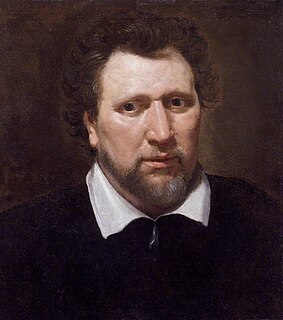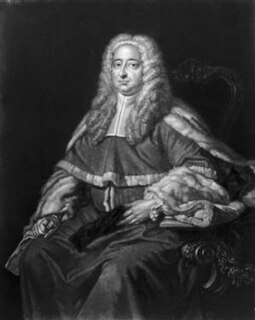Life
He was baptised on 22 July 1576, the third son of Richard Sharpham of Colehanger, a manor in the parish of East Allington. His father having died when Sharpham was five his mother married Alexander Hext, with whom she had three children. Having been widowed a second time in 1588, she subsequently married Charles Barnaby of Clement's Inn. [1]

East Allington is a village and civil parish in the South Hams district of Devon, England, three miles south of Halwell and just off the A381 road. It lies about three miles from Kingsbridge and about ten miles from Totnes. The coast at Slapton Sands is about five miles to the south-east. Also in the parish is the hamlet of The Mounts, about a mile away.
Sharpham probably attended grammar school in Devon, possibly William Kemp's school in Plymouth. He was admitted to the Middle Temple on 9 October 1594. [1]

Plymouth is a port city situated on the south coast of Devon, England, approximately 37 miles (60 km) south-west of Exeter and 190 miles (310 km) west-south-west of London. Enclosing the city are the mouths of the river Plym and river Tamar, which are naturally incorporated into Plymouth Sound to form a boundary with Cornwall.

The Honourable Society of the Middle Temple, commonly known simply as Middle Temple, is one of the four Inns of Court exclusively entitled to call their members to the English Bar as barristers, the others being the Inner Temple, Gray's Inn and Lincoln's Inn. It is located in the wider Temple area of London, near the Royal Courts of Justice, and within the City of London.
In 1592 Sharpham's mother began a lawsuit against a Thomas Fortescue, alleging he had murdered her first husband by poison and also used witchcraft to make her fall in love with him. Four years later Sharpham himself also sued Fortescue and another man, William Bastard, on a charge of having tampered with evidence relating to his mother's suit. He remained associated with the Middle Temple. [1]
On 22 April 1608, aged 31, Sharpham made his will. He died the next day, and was buried in St. Margaret's, Westminster. [1]
Works
Sharpham is believed to have been the 'E.S.' who in 1597 wrote The Discoverie of the Knights of the Poste, a pamphlet of the "conycatching" genre detailing the tricks of conmen active on the road between London and Exeter. He may also be the 'E.S.' who contributed a commendatory poem to the publication of Ben Jonson's Volpone (1607), although Jonson later described Sharpham as a "rogue". [1]

Benjamin Jonson was an English playwright, poet, actor, and literary critic, whose artistry exerted a lasting impact upon English poetry and stage comedy. He popularised the comedy of humours. He is best known for the satirical plays Every Man in His Humour (1598), Volpone, or The Fox, The Alchemist (1610) and Bartholomew Fair (1614) and for his lyric and epigrammatic poetry; he is generally regarded as the second most important English playwright during the reign of James VI and I after William Shakespeare.
His first known play, The Fleire, was written for one of the popular boys' theatre companies, the Children of the Blackfriars. Composition date is some time between late 1605 and the play's appearance in the Stationers Register on 13 May 1606. Cynical in tone, The Fleire is a court-oriented satire similar to Marston's The Malcontent and The Fawne. The play's popularity, at least as text, is shown by its being reprinted three times. [1]
The Children of the Chapel were the boys with unbroken voices, choristers, who formed part of the Chapel Royal, the body of singers and priests serving the spiritual needs of their sovereign wherever they were called upon to do so. They were overseen by the Master of the Children of the Chapel Royal.

John Marston was an English poet, playwright and satirist during the late Elizabethan and early Jacobean periods. His career as a writer lasted a decade, and his work is remembered for its energetic and often obscure style, its contributions to the development of a distinctively Jacobean style in poetry, and its idiosyncratic vocabulary.
Cupid's Whirligig was Sharpham's second and last play, produced early in 1607 and printed later the same year with a dedication to fellow Devonian and author Robert Hayman. Again, it satirises court life in a general way, though it has been speculated that the character Nucome, carefully described as 'Welsh', may actually be a veiled attack on the king's Scottish favourite Robert Carr. This play too was eventually reprinted three times. [1]

The earliest texts of William Shakespeare's works were published during the 16th and 17th centuries in quarto or folio format. Folios are large, tall volumes; quartos are smaller, roughly half the size. The publications of the latter are usually abbreviated to Q1, Q2, etc., where the letter stands for "quarto" and the number for the first, second, or third edition published.

Thomas Middleton was an English Jacobean playwright and poet. Middleton stands with John Fletcher and Ben Jonson among the most successful and prolific of the playwrights at work during the Jacobean period. He was among the few to achieve equal success in comedy and tragedy, and a prolific writer of masques and pageants.
John Day (1574–1638?) was an English dramatist of the Elizabethan and Jacobean periods.
Sir Edward Dyer was an English courtier and poet.
City comedy, also known as citizen comedy, is a genre of comedy in the English early modern theatre.

Francis Beaumont was a dramatist in the English Renaissance theatre, most famous for his collaborations with John Fletcher.
Edward Blount (1562–1632) was a London publisher of the Elizabethan, Jacobean, and Caroline eras, noted for his publication, in conjunction with William and Isaac Jaggard, of the First Folio of Shakespeare's plays in 1623.

The Merry Devil of Edmonton is an Elizabethan-era stage play; a comedy about a magician, Peter Fabell, nicknamed the Merry Devil. It was at one point attributed to William Shakespeare, but is now considered part of the Shakespeare Apocrypha.

Susanna Hall was the oldest child of William Shakespeare and Anne Hathaway, and the older sister of Judith Quiney and Hamnet Shakespeare. She married John Hall, a local physician, in 1607. They had one daughter, named Elizabeth, in 1608. Elizabeth married Thomas Nash, son of Anthony Nash on 22 April 1626 at Holy Trinity Church, Stratford-upon-Avon.

Thomas Thorpe was an English publisher, most famous for publishing Shakespeare's sonnets and several works by Christopher Marlowe and Ben Jonson. His publication of the sonnets has long been controversial. Nineteenth-century critics thought that he might have published the poems without Shakespeare's consent; Sidney Lee called him "predatory and irresponsible." Conversely, modern scholars Wells and Taylor assert their verdict that "Thorpe was a reputable publisher, and there is nothing intrinsically irregular about his publication."
The King's Revels Children or Children of the King's Revels were a troupe of actors, or playing company, in Jacobean era London, active in the 1607-9 period. They were part of a fashion for child actors that peaked in the first decade of the seventeenth century, with the Children of Paul's and the Children of the Chapel.
The Coxcomb is an early Jacobean era stage play, a comedy written by Francis Beaumont and John Fletcher. It was initially published in the first Beaumont and Fletcher folio of 1647.
George Eld was a London printer of the Jacobean era, who produced important works of English Renaissance drama and literature, including key texts by William Shakespeare, Ben Jonson, Christopher Marlowe, and Thomas Middleton.

John Fortescue Aland, 1st Baron Fortescue of Credan, of Stapleford Abbots, Essex, was an English lawyer, judge and politician who sat in the House of Commons for two years from 1715 to 1717. He wrote on English legal and constitutional history, and was said to have influenced Thomas Jefferson. A member of both the Middle Temple and Inner Temple, he became a King's Counsel in 1714 and was then appointed Solicitor General, first to the Prince of Wales and then to his father George I in 1715. After a short stint as a Member of Parliament, Fortescue Aland was knighted and elevated to the Bench as a Baron of the Exchequer in 1717. He was subsequently a justice of the Court of King's Bench (1718–1727) and of the Court of Common Pleas (1728–1746), save for a brief hiatus between 1727 and 1728 which has been attributed to George II's displeasure with one of his legal opinions.
Francis Marbury (1555–1611) was a Cambridge-educated English cleric, schoolmaster and playwright. He is best known for being the father of Anne Hutchinson, considered the most famous English woman in colonial America, and Katherine Marbury Scott, the first known woman to convert to Quakerism in the United States.

Sir William Fortescue of Buckland Filleigh, Devon, was a British judge and Master of the Rolls 1741–1749.
William Cotton was the Archdeacon of Totnes.
Cupid’s Whirligig, by Edward Sharpham (1576-1608), is a city comedy set in London about a husband that suspects his wife of having affairs with other men and is consumed with irrational jealousy. It was first published in quarto in 1607, entered in the Stationer’s Register with the name "A Comedie called Cupids Whirlegigge." It was performed that year by the Children of the King’s Revels in the Whitefriars Theatre where Ben Jonson’s Epicene was also said to have been performed.












